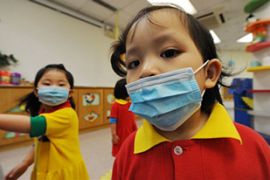H1N1 vaccine supply ‘inadequate’
UN health agency says production over next year “substantially less” than foreceast.

Single dose
About 85 of the WHO’s 193 member states have reported that they do not have access to H1N1 vaccine supplies, according to Hartl.
| In depth |
|
|
Healthcare workers and people at high risk, including pregnant women and those with underlying conditions such as asthma or diabetes, should be top priority for receiving the new vaccine, he said.
“All the clinical trial results that we have seen show that apparently one dose is enough,” Hartl said.
Hartl gave no new forecast for annual production capacity, but Dr Marie-Paule Kieny, a WHO vaccine expert, is set to give a briefing next Thursday.
The WHO continues to recommend that people be inoculated against both seasonal and H1N1 flu.
The health body previously forecast that one-third of the world’s nearly seven billion people could be affected by the H1N1 pandemic, but so far the vast majority of victims are suffering only mild symptoms.
Donation programme
The WHO welcomed an agreement among nine rich countries that they will share the H1N1 vaccine with less-developed countries under a donation programme over the next six to eight months.
 |
| The majority of the H1N1 victims so far have suffered only mild symptoms [AFP] |
“The announcement demonstrates the commitment of these countries to fairness in sharing of scarce resources as the [H1N1] pandemic 2009 continues to evolve,” the WHO said.
Under the deal, announced overnight, the US pledged 10 per cent of its supply, joining Australia, Brazil, Britain, France, Italy, New Zealand, Norway and Switzerland.
The agency said it had no overall figure for the vaccine donation.
Vaccine makers GlaxoSmithKline and Sanofi-Pasteur previously pledged 120m doses to the WHO.
Side-effects
Vaccines donated to the agency will be distributed to those needy countries able to ensure adequate distribution and vaccination plans are in place, he said.
Another criteria is their ability to do checks to detect any side effects.
“The order in which we distribute vaccines would also depend on where on the epidemiological curve the country is,” Hartl said, referring to whether the pandemic strain has already struck a given population or is about to.
About 3,486 people have died of swine flu to date, about 300 of them in the past week, according to a new WHO tally.

 Politics of combating H1N1
Politics of combating H1N1